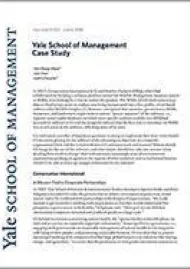San Miguel (B)

In May of 2014 two months after the Global Network for Advanced Management published its case study about San Miguel, Dr. Benito Manrique de Lara, the charismatic founder of the company, died. The death shocked the small community of Huixcazdha. The 53-year old Dr. Benito had not shown any signs of ill health. He passed away in his sleep and was discovered in the stone cottage he had built by hand near the amaranth processing factory.
The death left a tremendous void that Dr. Benito’s two long-term partners quickly agreed to fill. His brother Diego Manrique de Lara rushed backed to Mexico from Denmark, where he had been in the tourism business for two decades. The other partner, Bruno Pagliai, who served as the company’s chief financial officer, now agreed to play a more active role in strategy and management.
After nearly a year at the helm, San Miguel’s two new leaders managed to keep the small company afloat. While revenues declined, profits actually increased during 2014. San Miguel continued to produce a variety of products—nutritional supplements, snacks, and baking goods—for sale to public agencies, small retail outlets, and food manufacturers. Nonetheless, making sales continued to be a struggle. Government contracts accounted for almost 70 percent of the company’s revenues and the slump in oil prices meant that government contracts, always subject to political maneuvering, could become even more difficult to secure.
Pagliai and Diego Manrique were considering two new investment:
1) A nutraceutical product called Hepato Plus, manufactured from San Miguel amaranth, had entered medical testing for treatment of cirrhosis.
2) Bimbo, Mexico’s baked goods giant, had inquired about a possible distribution deal for amaranth-based snacks.
The two options were not mutually exclusive, but with limited investment resources (both in terms of management time and capital) the partners had to weigh their options carefully. They both agreed that they needed something to shore up revenues. Diego Manrique argued, “It’s not sustainable in the long run. We need to ramp up sales one way or the other.”